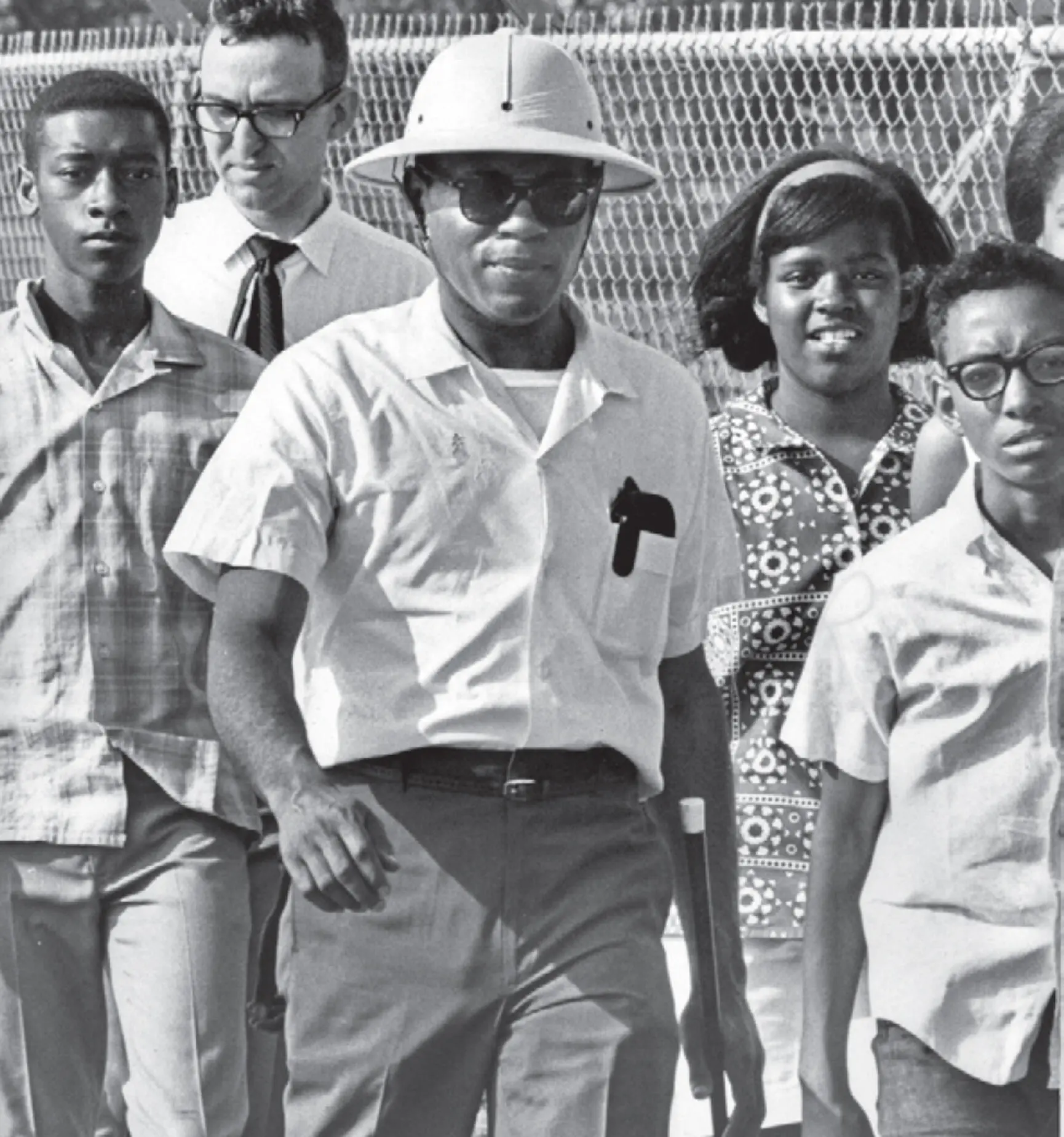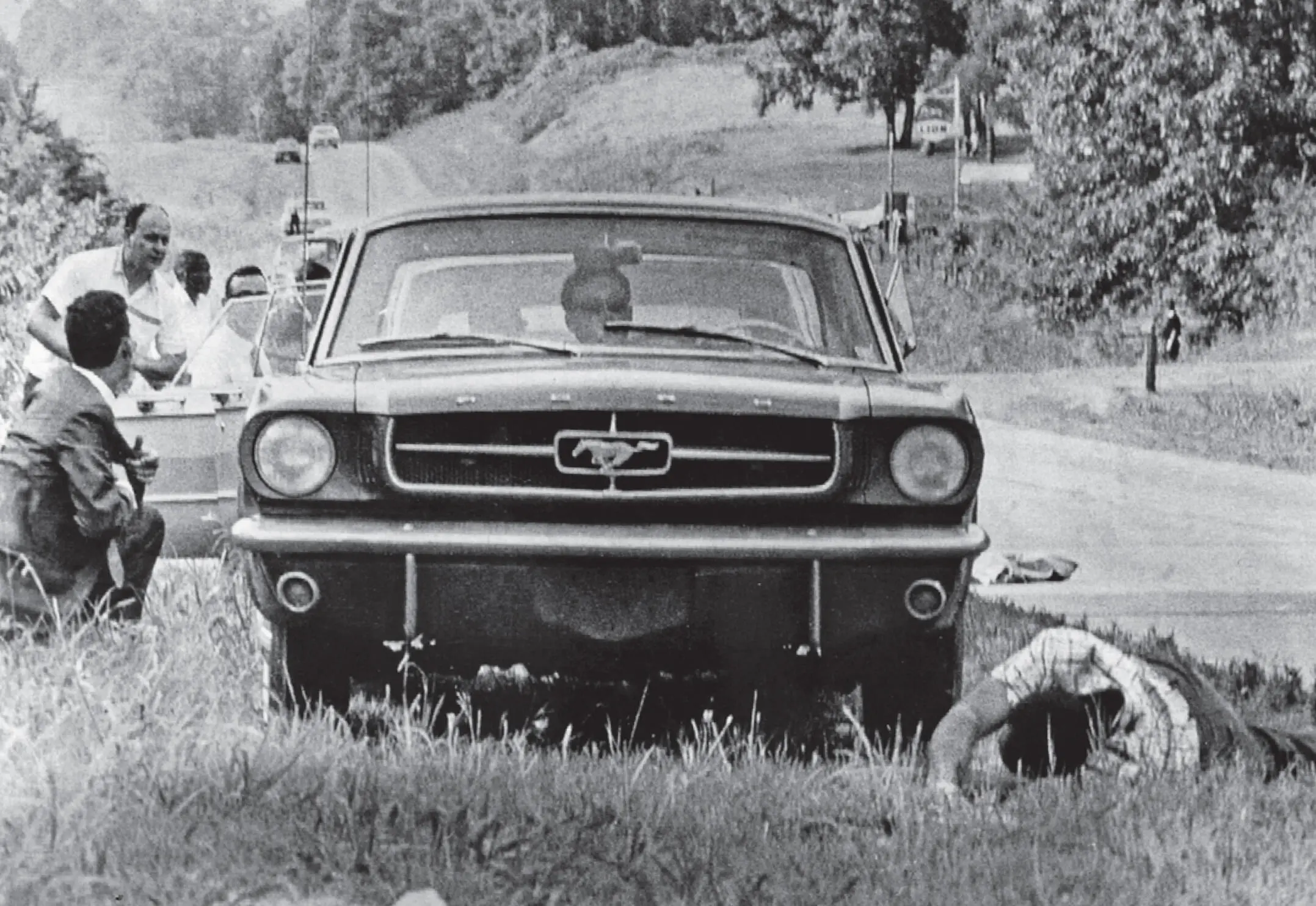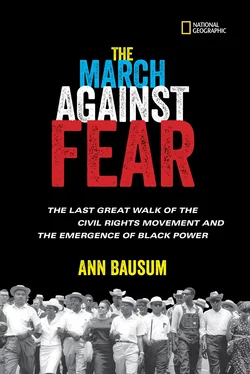But Meredith had another reason to undertake the endeavor, too, and it came from another one of his outsize goals. Ever since his teen years, he had entertained the idea of campaigning to become the governor of Mississippi. Two decades later, he still wanted to run for governor, but he knew he had no chance for success as long as the people most likely to vote for him were the people least likely to show up at the polls. Thus Meredith hoped his walk through Mississippi could serve two purposes. Not only might it encourage the state’s blacks to become voters. It might inspire them to vote for him in a future political race.

Meredith departed from Memphis, Tennessee, on foot, bound for Jackson, Mississippi, 220 miles away, on June 5, 1966. Friends and onlookers joined him for stretches of the first day’s walk. Credit 6
This time, Meredith wanted his activism to be different from the confrontation at Ole Miss. He wanted no federal troops, no bloodshed, no drama.
No big deal.
That was the plan.
He couldn’t have chosen a tougher place for his undertaking. Mississippi was arguably, in 1966, the most segregated, most oppressive state in the Union when it came to its treatment of African Americans. The Mississippi power structure ensured that whites controlled the governor’s office, the state legislature, and local communities. Whites served as judges, and jurors, and jailers. Whites ran its school boards, elections, and voter registration. Whites controlled the newspapers in the state and ran its most prosperous businesses. Whites dominated the farms that produced the cotton that was synonymous with Mississippi, a crop that for centuries had been picked almost exclusively by slaves and their descendants.
Meredith’s walk seemed guaranteed to provoke controversy. He would be striding into a state where people had threatened his life repeatedly during the Ole Miss fight just four years earlier. The sheer audacity of a black man walking into Mississippi, head held high, afraid of no one, could only spell trouble in an era when such organizations as the terror-based Ku Klux Klan and the less violent but equally racist local White Citizens’ Councils influenced life in Mississippi as much as—or more than—elected officials and the rule of law.
Despite the dangers, Meredith made the barest of plans for his trip, although he later claimed to have purchased a sizable life insurance policy to provide for his family in case someone killed him. He debated whether to arm himself. Months before his departure, Meredith had alerted local authorities of his intentions and requested law enforcement protection during his walk; perhaps he should trust he would be secure. Although Meredith had not seen himself as being devoted to the power of nonviolence, he wasn’t an advocate for violence either. In the end, he dismissed the idea of bringing a weapon and decided to arm himself with a Bible instead.
Meredith set off on the afternoon of Sunday, June 5, 1966, with $11.35 in his pockets. He carried no backpack, or bedroll, or food. “There are a million Negroes in Mississippi, and I think they’ll take care of me,” he told the cadre of reporters on hand to accompany him. A handful of local black supporters came along, too, as did several allies who had traveled from northern cities to take part in the effort. Memphis officials didn’t want to invite criticism for failing to protect Meredith if something went wrong, so a police escort joined the group, too.
The entourage departed from the historic Peabody Hotel in downtown Memphis, crossed through the city’s segregated neighborhoods, and passed the gates of Elvis Presley’s Graceland home, bound for the Mississippi state line. Most people along the route were friendly. Blacks waved. Whites generally stared or ignored him. A few people expressed their objections by jeering, making threatening comments, or waving the Confederate battle flag, a Civil War–period symbol that segregationists had resurrected during the civil rights era.
Meredith hiked with his own symbols, including a walking stick made from ebony and ivory that a Sudanese village chief had given him during his stay in Africa. “We shall arrive,” the chief had told his American friend at the time; Meredith hoped the memory would serve him well on his new journey. Meredith wore a short-sleeved cotton shirt, gray slacks, and hiking boots on that hot, sunny afternoon. He shaded his face with a yellow pith helmet, another symbol of his connection to Africa. After covering 12 miles in fewer than five hours, Meredith reached his objective for the day: Mississippi. The state line lay just ahead and could wait until tomorrow.
He and his companions resumed their walk the next morning, Monday, June 6, accompanied once again by members of a press corps that, at the time, was predominately composed of white men. Mississippi law enforcement officers took the place of those from Tennessee as they crossed the boundary. The high point for Meredith on the second day’s hike came when they reached Hernando, the first town south of the state line. Some 150 local blacks turned out to greet him, offer encouragement, and give him assistance—everything from a free hamburger to a dollar bill.
“I was ecstatic,” Meredith recalled, decades later. He hadn’t been sure if his walk would inspire others to be brave. Just gathering to meet him took real nerve during an era when any demonstration of support for racial equality in the Deep South could trigger retaliation from whites who controlled the region’s jobs and jails. When he’d set out on his walk, Meredith had believed, as he would later state, that the “day for Negro men being cowards is over,” and here was evidence that he was right.
Then 90 minutes later a gunman literally stopped James Meredith in his tracks.
“With this announcement black people across the country began crossing Meredith’s name from the list of those in the land of the living…
They were black and they knew.
Mr. Meredith had announced his death.”
Julius Lester, civil rights activist and author, recalling reactions to James Meredith’s announcement for his walk through Mississippi
“I don’t think it’s going to amount to much.”
Nicholas Katzenbach, attorney general of the United States, commenting on James Meredith’s plan to walk from Memphis to Jackson
“I think the entire incident is God’s gift to the civil rights movement. We can do with it what we will. If we accept it and build on it, who knows what might come of it?”
James Lawson’s thoughts for Martin Luther King, Jr., about the attack on James Meredith and his survival


After being ambushed on June 6, James Meredith fell beside a row of cars where witnesses to his attack had sought shelter. Credit 7
NOTHING ABOUT Aubrey Norvell’s life appeared particularly noteworthy until Monday, June 6, 1966, when he started firing a shotgun at an icon of the civil rights era. Norvell and his wife lived in a quiet suburban neighborhood in Memphis, Tennessee. They had no children. They’d married shortly after World War II, a conflict in which Norvell had served with distinction. He and his father had owned and run a local hardware store together until 1963; in recent months he had been unemployed. No one could recall him commenting for or against racial equality, nor did he have any known connections to white supremacy groups.
Читать дальше














